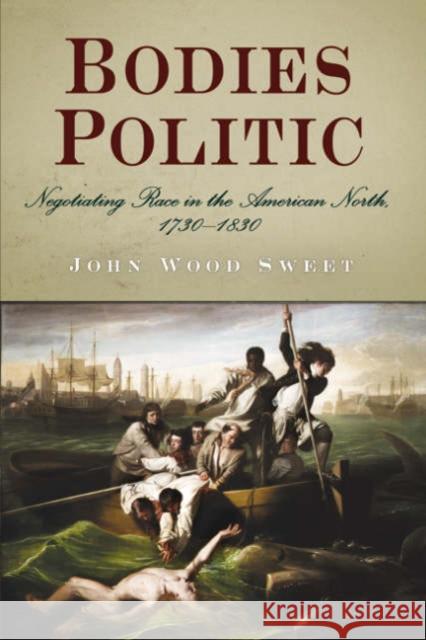Bodies Politic: Negotiating Race in the American North, 173-183 » książka
Bodies Politic: Negotiating Race in the American North, 173-183
ISBN-13: 9780812219784 / Angielski / Miękka / 2007 / 504 str.
Bodies Politic Negotiating Race in the American North, 1730-1830 John Wood Sweet "At once detailed and sweeping, social and political, archival and synthetic. . . . This book is the best application yet to early American history of postcolonial theory."--American Historical Review "An ambitious and persuasive account of the ways the political inclusion of some groups and not others connected the colonial era through the Revolution to the early American republic."--Journal of American History "Sweet offers scholars a capacious history of race in the North and a primer for thinking about the relationship between 'cultures' and identities. . . . Bodies Politic is deeply researched and richly detailed."--William and Mary Quarterly "This superb study explores the origins of that ironic definition of democracy as 'universal freedom and racial inequality.' . . . Sophisticated and engaging. . . . Highly recommended."--Choice In this sweeping analysis of colonialism and its legacies, John Wood Sweet explores how the ongoing interaction of conquered Indians, English settlers, and enslaved Africans in New England produced a closely interwoven, though radically divided, society. The coming together of these diverse peoples profoundly shaped the character of colonial New England, the meanings of the Revolution in the North, and the making of American democracy writ large. Critically engaged with current debates about the dynamics of culture, racial identity, and postcolonial politics, this innovative and intellectually capacious work is grounded in a remarkable array of evidence. What emerges from this analysis of colonial and early national censuses, newspapers, diaries, letters, court records, printed works, and visual images are the dramatic confrontations and subtle negotiations by which Indians, Africans, and Anglo-Americans defined their respective places in early New England. Citizenship, as Sweet reveals, was defined in meeting houses as well as in courthouses, in bedrooms as well as on battlefields, in land disputes as well as on streets. Bodies Politic reveals how the legacy of colonialism shaped the emergence of the nineteenth-century North and continues, even to this day, to shape all our lives. John Wood Sweet is Associate Professor of History at the University of North Carolina and coeditor (with Robert Appelbaum) of Envisioning an English Empire: Jamestown and the Making of the North Atlantic World, also available from the University of Pennsylvania Press. 2007 504 pages 6 x 9 24 illus. ISBN 978-0-8122-1978-4 Paper $24.95s 16.50 World Rights American History, African-American/African Studies Short copy: "Sweet offers scholars a capacious history of race in the North and a primer for thinking about the relationship between 'cultures' and identities. . . . Bodies Politic is deeply researched and richly detailed."--William and Mary Quarterly
Bodies PoliticNegotiating Race in the American North, 1730-1830John Wood Sweet"At once detailed and sweeping, social and political, archival and synthetic. . . . This book is the best application yet to early American history of postcolonial theory."--American Historical Review"An ambitious and persuasive account of the ways the political inclusion of some groups and not others connected the colonial era through the Revolution to the early American republic."--Journal of American History"Sweet offers scholars a capacious history of race in the North and a primer for thinking about the relationship between 'cultures' and identities. . . . Bodies Politic is deeply researched and richly detailed."--William and Mary Quarterly"This superb study explores the origins of that ironic definition of democracy as 'universal freedom and racial inequality.' . . . Sophisticated and engaging. . . . Highly recommended."--ChoiceIn this sweeping analysis of colonialism and its legacies, John Wood Sweet explores how the ongoing interaction of conquered Indians, English settlers, and enslaved Africans in New England produced a closely interwoven, though radically divided, society. The coming together of these diverse peoples profoundly shaped the character of colonial New England, the meanings of the Revolution in the North, and the making of American democracy writ large.Critically engaged with current debates about the dynamics of culture, racial identity, and postcolonial politics, this innovative and intellectually capacious work is grounded in a remarkable array of evidence. What emerges from this analysis of colonial and early national censuses, newspapers, diaries, letters, court records, printed works, and visual images are the dramatic confrontations and subtle negotiations by which Indians, Africans, and Anglo-Americans defined their respective places in early New England. Citizenship, as Sweet reveals, was defined in meeting houses as well as in courthouses, in bedrooms as well as on battlefields, in land disputes as well as on streets. Bodies Politic reveals how the legacy of colonialism shaped the emergence of the nineteenth-century North and continues, even to this day, to shape all our lives.John Wood Sweet is Associate Professor of History at the University of North Carolina and coeditor (with Robert Appelbaum) of Envisioning an English Empire: Jamestown and the Making of the North Atlantic World, also available from the University of Pennsylvania Press.2007 | 504 pages | 6 x 9 | 24 illus.ISBN 978-0-8122-1978-4 | Paper | $24.95s | L16.50 World Rights | American History, African-American/African StudiesShort copy:"Sweet offers scholars a capacious history of race in the North and a primer for thinking about the relationship between 'cultures' and identities. . . . Bodies Politic is deeply researched and richly detailed."--William and Mary Quarterly











